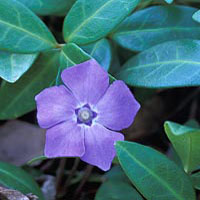Penn Herb Wellness Guide
PeriwinkleFind Products
 © Martin Wall
© Martin WallParts Used & Where Grown
The flower and leaf of lesser periwinkle are used medicinally. Periwinkle is an evergreen shrub that grows in Europe, northwestern Africa, central Asia, and some parts of North America.
- Reliable and relatively consistent scientific data showing a substantial health benefit.
- Contradictory, insufficient, or preliminary studies suggesting a health benefit or minimal health benefit.
- For an herb, supported by traditional use but minimal or no scientific evidence. For a supplement,little scientific support.
Our proprietary “Star-Rating” system was developed to help you easily understand the amount of scientific support behind each supplement in relation to a specific health condition. While there is no way to predict whether a vitamin, mineral, or herb will successfully treat or prevent associated health conditions, our unique ratings tell you how well these supplements are understood by the medical community, and whether studies have found them to be effective for other people.
For over a decade, our team has combed through thousands of research articles published in reputable journals. To help you make educated decisions, and to better understand controversial or confusing supplements, our medical experts have digested the science into these three easy-to-follow ratings. We hope this provides you with a helpful resource to make informed decisions towards your health and well-being.
This supplement has been used in connection with the following health conditions:
| Used for | Amount | Why |
|---|---|---|
Alzheimer’s Disease | Refer to label instructions | Lesser periwinkle contains the alkaloid vincamine, whichhas shown some benefit to people with Alzheimer’s disease.
|
Canker Sores | Refer to label instructions | Periwinkle is an astringent herb that can be used as a mouth rinse to soothe the pain of canker sores. The herb contains tannins that can bind up fluids and possibly relieve inflammation. |
Diarrhea | Refer to label instructions | European herbalists have used periwinkle for conditions with a watery discharge, such as diarrhea. |
Glaucoma | Refer to label instructions | One double-blind and one preliminary study have found that brovincamine, a compound closely related to periwinkle's active constituent vinpocetine, was helpful in people with chronic glaucoma. Until studies have been conducted using actual vinpocetine, it is unknown whether it would be as effective as brovincamine. |
Hearing Loss | Refer to label instructions | Periwinke's active constitent vinpocetine has been associated with beneficial effects on hearing loss due to aging (presbyacusis), tinnitus, and ethyl-apovincaminate (a vinca alkaloid) may reduce ringing in the ears (tinnitus). |
Kidney Dialysis | Refer to label instructions | One uncontrolled study found that vinpocetine, periwinkle's active constituent, for 3 to 12 months helps eliminate calcium buildup in people undergoing dialysis. |
Menorrhagia | Refer to label instructions | Astringent herbs such as periwinkle have been traditionally used for heavy menstruation. |
Tinnitus | Refer to label instructions | Periwinkle contains a compound that has been shown to reduce symptoms in people whose tinnitus is due to poor blood flow. |
Vascular Dementia | Refer to label instructions | A closely related semisynthetic derivative of vincamine (periwinkle's active constituent) most widely used as medicine is known as ethyl-apovincaminate or vinpocetine. It has been shown in double-blind studies to help alleviate a type of dementia known as vascular dementia, in which the arteries supplying blood to the brain develop atherosclerotic plaques |
Traditional Use (May Not Be Supported by Scientific Studies)
Periwinkle has likely been used for medicine for a long time; its Latin name, Vinca, is derived from the Latin word vincere, meaning “to overcome.” European herbalists have used periwinkle for headaches, vertigo, and poor memory since medieval times.1 It was also considered a helpful remedy for conditions with a watery or bloody discharge such as diarrhea, bleeding gums, or menorrhagia.2
Copyright 2025 TraceGains, Inc. All rights reserved.
Learn more about TraceGains, the company.
The information presented by TraceGains is for informational purposes only. It is based on scientific studies (human, animal, or in vitro), clinical experience, or traditional usage as cited in each article. The results reported may not necessarily occur in all individuals. Self-treatment is not recommended for life-threatening conditions that require medical treatment under a doctor's care. For many of the conditions discussed, treatment with prescription or over the counter medication is also available. Consult your doctor, practitioner, and/or pharmacist for any health problem and before using any supplements or before making any changes in prescribed medications. Information expires December 2025.


